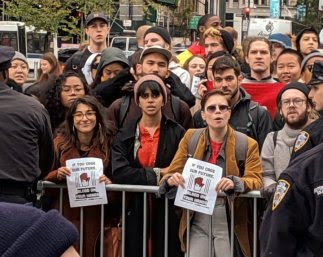Prisoners’ families, activists denounce plan to build new jails
 |
| Greg Butterfield – October 24, 2019 |
“Close Rikers now! No new jails!” The chant was loud, the demand was clear, as hundreds of prisoners’ family members, former prisoners and prison abolition activists rallied and marched at New York’s City Hall on Oct. 17.
That day, the City Council was set to vote on a proposal backed by Mayor Bill de Blasio to close the city’s notorious Rikers Island prison complex by 2026 — but only to replace it with four new high-rise jails at a cost of at least $8 billion.
Another popular chant was, “If they build it, they will fill it!” — recognizing that building new jails would in no way lead to less racist policing and mass incarceration. Protesters also called out de Blasio, who styles himself a progressive, as “Trump’s mayor,” to point out that with his moves to build new jails and privatize public housing, he serves the very same big capitalist interests as Trump.
Cops and corrections officers were ushered into City Hall to testify against closing Rikers, while opponents of Rikers and the new jails plan from the No New Jails campaign were kept out. Outside, the New York Police Department acted aggressively toward the protesters, and used dirty tricks like pulling up an armored police truck with lights flashing to a City Hall gate to justify arresting activists for “blocking an emergency vehicle.”
When some prison abolitionists finally got inside the council hearing, they heard many liberal and progressive council members using abolitionist language like “decarceration” and invoking the name of Khalief Browder—who killed himself in 2015 after spending three years in Rikers without trial or a hearing—to justify voting for building new jails. Angry protesters unfurled banners and spread leaflets before being ejected.
The “progressive” support by the mayor and the City Council for building new jails echoes that of big nonprofit foundations which have backed the plan. During a September appearance in New York, former political prisoner and prison abolitionist Angela Davis threw her weight behind the No New Jails campaign, calling out the head of the Ford Foundation for supporting the plan to build new jails. Afterward, 100 former Ford Fellows issued an open letter condemning the new jails and a protest was held outside the Ford Foundation headquarters.
“I support closing Rikers and I separate that from the new jails,” said Councilmember Inez Barron, a Black liberation activist who voted against the plan. She pointed out the hypocrisy of her fellow councilmembers, many of whom voted in 2015 to give $100 million to the racist NYPD to hire 1,300 more cops to lock up Black and Brown New Yorkers, but now were claiming progressive credibility for the new jails plan. “Where did this great epiphany come from?” she asked.
Others pointed out that the plan does not guarantee that Rikers would actually close by 2026, if at all, while the construction of new jails in the boroughs of the Bronx, Brooklyn, Manhattan and Queens moves forward. The council approved $391 million for “community-based resources to address the root causes of incarceration” — a pittance compared to the $8 billion pledged for building new jails, and which opponents of the plan say is likely to balloon to $11 billion or more.
The plan to build new jails was passed by the City Council by a vote of 36-13.
While corporate media headlines echoed the mayor and City Council line about “closing Rikers” while leaving out the reality of new, expensive jails, the No New Jails campaign stated: “These jails are not built, and they will not be built. We are more committed than ever to closing Rikers immediately with no new jails. The fight is just beginning. Join us.”
And on Oct. 19, two days after the vote, the group crashed an “open house” held by AECOM, a company which already has a $100,000 contract to design the four new jails, in a gentrified area of Sunset Park, Brooklyn.


